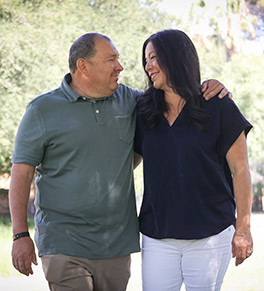Mantle cell lymphoma patient gets lifesaving transplant

Photo: Carlos Puma for UCI Health.
When treatments elsewhere failed to knock out his lymphoma, Sean Ramos turned to UCI Health cancer specialists, who devised an intensive plan of chemotherapy, radiation and a transplant with bone marrow stem cells donated by one of his sisters.
After undergoing the procedure at Orange County’s only adult bone marrow transplant program, Ramos went home last November in time for his beloved wife’s birthday. A year later, with no sign of cancer, he's able to celebrate Rebecca's birthday again and share his love of sports with their four children.
The UCI Health Chao Family Comprehensive Cancer Center "has been my lifeline,” he said. “I don’t think I would be here without them.”
Ramos, 51, credits his health to everyone who cared for him: medical oncologists, radiation oncologists, transplant specialists, highly skilled nurses and professional technicians across the board. “It really takes a village,” he said.
As the only Orange County-based National Cancer Institute-designated comprehensive cancer center, the UCI Health cancer center has the depth and breadth of expertise to treat patients with all types of cancer, offering them the most advanced therapies as well as stem-cell transplants, access to leading-edge clinical trials and a full range of supportive care.
Lymphoma specialist Dr. Lauren C. Pinter-Brown — who with her team orchestrated Ramos' therapy plan and worked hand-in-glove with the transplant team — said this level of advanced, multidisciplinary care is unique to the Chao Family Comprehensive Cancer Center and other similarly NCI-designated centers.
First signs
Sean Ramos’ journey started in April 2018 with a trip to an emergency room near his family’s Riverside home. He had been plagued by headaches, fatigue and gastrointestinal distress. He thought maybe he’d caught a nasty stomach bug.
After a series of tests, doctors stunned him with their diagnosis: lymphoma, a type of cancer that affects the body’s white blood cells, a crucial part of the immune system.
“Your world just comes to a stop," he recalled of that moment.
His thoughts turned immediately to Rebecca, 47, and the kids: Mikayla, Luke, Max and Liam. He vowed to fight for his life with all he had.
Sean and Rebecca Ramos had consulted first with a local oncologist. They decided to get a second opinion at UCI Health, which was in their insurance network.
Correcting a diagnosis
That’s when the couple met Pinter-Brown, a nationally regarded lymphoma expert.
She told Sean that his pathology report had been misread. He actually had mantle cell lymphoma, a rare and deadly type of non-Hodgkin lymphoma. This disease, which attacks certain white blood cells called lymphocytes, required an entirely different treatment plan, she said.
In addition to chemotherapy, Pinter-Brown suggested he consider a transplant of blood stem cells. Since UCI Health didn’t yet offer the procedure, Sean received a transplant of his own treated stem cells in fall 2018 at another cancer center in the region.
After his lymphoma reappeared in spring 2020, he had CAR T-cell therapy, a treatment with genetically altered immune cells. By early August, he learned that it, too, was unsuccessful.
Weighing options
Sean turned again to UCI Health and Pinter-Brown to review his options. She recommended a more aggressive chemotherapy drug and encouraged him to consult with the cancer center’s new bone marrow transplant team.
Program director Dr. Stefan O. Ciurea, a leader in stem-cell transplantation and CAR T-cell therapy, met with Sean immediately and mapped a plan of attack in coordination with Pinter-Brown’s team. They would prepare him for another transplant, this time with donor cells.
Undaunted by the previous failures, Ciurea assured Sean, “We can cure your disease.
Treatment started with five weeks of intensive chemotherapy and radiation to kill any remaining cancer cells — including a tangerine-size tumor in his clavicle and one the size of a ping-pong ball at his beltline.
Preparing the donor
Meanwhile, Brigette Gosney, one of his five sisters, began receiving a hormone to stimulate her body’s production of blood-forming hematopoetic stem cells. (In 2018, she and another sister were found to be identical donor matches for their brother.)
Once Sean’s body was wiped clear of all his white blood cells, he underwent an allogeneic transplant, receiving an infusion of Gosney’s stem cells in late October. He spent the next few weeks isolated in a pressurized hospital room to prevent infection while his body began rebuilding his immune system.
Sean had made only one request: to be released in time for his wife’s birthday.
On Nov. 15, 2020, Rebecca got the best gift of all — Sean made it home safely to watch her blow out her birthday candles.
“There are no words to explain how much I love him and how happy I am that he’s doing well," Rebecca said during a recent cable TV interview as she wiped away tears.
‘Living life fully’
Sean has resumed his job as a captain with a state law enforcement agency and he attends his children’s baseball games and practices most evenings and weekends.
His latest scan in October showed no hint of cancer cells, great news just in time for his wife’s birthday this year.
It’s cause for celebration for Ciurea, Pinter-Brown and the cancer center teams, too. "This is our goal, to get patients back to living life fully," he said.
The cancer center’s Hematopoietic Stem Cell Transplantation and Cellular Therapy Program has performed transplants on more than 40 patients since the first procedure in May 2020 and the results continue to be very promising.
Sean still visits the cancer center in Orange for periodic blood draws to track his progress. But he has no doubt that he’ll be celebrating Rebecca’s birthdays for the foreseeable future.
“I plan to watch my kids grow up, watch my daughter get married and get old with my wife. That’s my goal."
Related stories
Explore Further
Browse more blog posts by topic.




